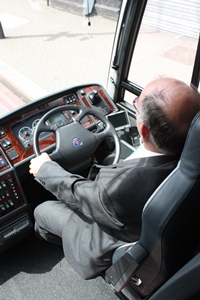
UK coach operators travelling in France stand to benefit from a major concession to new French rules on minimum wages and conditions thanks to the role played by CPT’s Director of Policy Development, Steven Salmon, the trade body said.
At a high level meeting in Brussels on Thursday, the French Government conceded that ‘closed door’ tours from the UK (and other countries) with non-French customers should be considered as transit operations, and should therefore be exempt from the requirement to match French wages and conditions. This applies whether the tour simply goes from England to France and back, or visits France as part of a longer itinerary including over-night stays.
Steven Salmon, CPT Director of Policy Development, said: “The rules originally proposed by the French Government would have placed considerable financial and administrative burdens on CPT coach operator members running tours and short trips to France. The French Government representatives accepted that there is no French customer for this work, so there is no basis under the Posting of Workers Directive for controls on the pay and conditions of workers carrying it out.”
He added: “This issue has been a major cloud hanging over our coach operator members for the last couple of months. This concession will be a huge relief and will enable them to maintain their competitiveness and keep tour prices down for passengers.”
CPT’s Chief Executive Simon Posner paid tribute to the role Steven played in securing this important development: “The key role Steven has played cannot be over emphasised and I know will be warmly welcomed by CPT’s coaching members. This success comes close on the heels of France backing down from its unwelcome new interpretation of the EU rules on breaks when two drivers are working together, which was secured by CPT, IRU (International Road Transport Union) and other trade bodies working collaboratively to score a major goal for UK coach operators.”
He concluded: “Once again, the prominent role of CPT in the industry’s relations with the European institutions has paid off, ensuring that our members are able to operate successfully on the Continent.”


